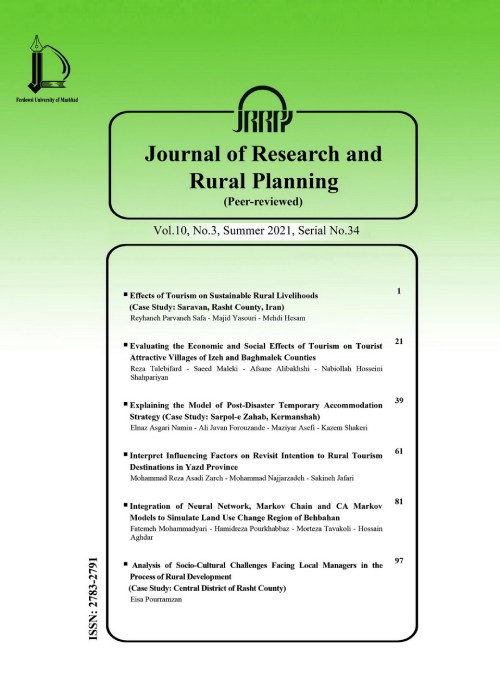Analyzing the Barriers and Limitations of Rural Women Employment (Case Study: Tuyserkan County)
Author(s):
Abstract:
Introduction
Employment is critical for poverty reduction and for enhancing womens status, especially in rural community. The notion of work and self-employment for women is complex and different factors affect women employment. Based on research results and experiences in developing countries, in rural areas, women as a significant part of the population, face some social, cultural, economic and institutional limitation for starting or promoting a business. In this research, through a survey in a rural society, most of the barriers and limitations of rural women employment were distinguished and analyzed.THEORETICAL FRAMEWORK : Rural employment is a key to economic and social development in many countries like Iran. Thats why many researchers tried to find solutions and strategies for progression of rural employment especially for women, and also the barriers and obstacles of rural women self-employment. Based on researches, many different barriers can prevent the process of starting and developing a business. Some studies showed that socio-economic barrier like family opposition or lack of family supports, lack of women self-confidence and some cultural values and belief against women self-employment prevent the progression of women business in rural areas. Also, generally rural women have less access to fund and credit and this factor can limit the rate of self-employment and entrepreneurship by rural women. Lack of empowerment and skill is another issue that decreases the level of business starting by rural women. Personal characteristic and competence is also needed for staring a new business. Some researchers showed that lack of some competencies like self-confidence, ambiguity tolerance, risk taking and spirit of independence can prevent the level of self-employment intention. Based on researches, different barriers could have different influences on different societies and thats why, for drawing a conceptual map for barriers of women employment and entrepreneurship, quantitative survey is needed. In this survey research, the role of different cultural, social, personal and institutional barriers and limitations of rural women employment were assessed through a factor analysis.
Methodology
The current applied research is a quantitative and non-experimental study in terms of variables controlling. The main purpose of the study was to distinguish and analyze the most important barriers and limitations of rural womens employment. To do that, 150 rural women in Tuyserkan, Hamedan province, were selected randomly as research sample. Based on review of theoretical literature, a structured questionnaire was made and used as a main tool to collect data. The validity of the questionnaire was assessed by panel of experts and the Reliability was measured by "Cronbach α" test (α=0.81). In order to analyze data, both SPSS18 and LISREL8.8 software were used. The SPSS was used for describing data and factor analysis and the LISREL was used in order to modelling structural equations. The results of structural equations showed good fitness of the model used for analyzing barriers of rural women employment. (RMSEA=0.063, AGFI=0.8, GFI=0.93(.Discussion
Findings showed that rural women in this research face a group of limitations and barriers in starting and managing their business. Using exploratory factor analysis revealed that four main obstacles are very important in the process of starting and promoting business by rural women in their point of view. The most important factors were socio-cultural barriers like family opposition, lack of women self-confidence and some cultural values and belief against women self-employment (with 22.03% of barriers variances). This factor with some other barriers such as economic-environmental, personality and training-supporting barriers explained 62.30% of the variances of employment barriers.Conclusion
According to the research results, it was found that rural women in this survey face different limitation and barriers in the process of self-employment which can influence on this process differently. Based on the research, it is recommended to pay attention to some cultural programs through media or social activities in order to reform some social and cultural barriers such as traditional mindset towards women's empowerment and their participation. It is also essential to provide learning opportunities for both men and women in rural areas in order to believe women and daughter abilities and empowerments in economic and social activities. The research results can help policymakers and managers to develop suitable supportive plans in different stages of starting and managing rural business by women.Keywords:
Language:
Persian
Published:
Journal of Research and Rural Planning, Volume:6 Issue: 1, 2017
Pages:
35 to 48
magiran.com/p1701046
دانلود و مطالعه متن این مقاله با یکی از روشهای زیر امکان پذیر است:
اشتراک شخصی
با عضویت و پرداخت آنلاین حق اشتراک یکساله به مبلغ 1,390,000ريال میتوانید 70 عنوان مطلب دانلود کنید!
اشتراک سازمانی
به کتابخانه دانشگاه یا محل کار خود پیشنهاد کنید تا اشتراک سازمانی این پایگاه را برای دسترسی نامحدود همه کاربران به متن مطالب تهیه نمایند!
توجه!
- حق عضویت دریافتی صرف حمایت از نشریات عضو و نگهداری، تکمیل و توسعه مگیران میشود.
- پرداخت حق اشتراک و دانلود مقالات اجازه بازنشر آن در سایر رسانههای چاپی و دیجیتال را به کاربر نمیدهد.
In order to view content subscription is required
Personal subscription
Subscribe magiran.com for 70 € euros via PayPal and download 70 articles during a year.
Organization subscription
Please contact us to subscribe your university or library for unlimited access!


